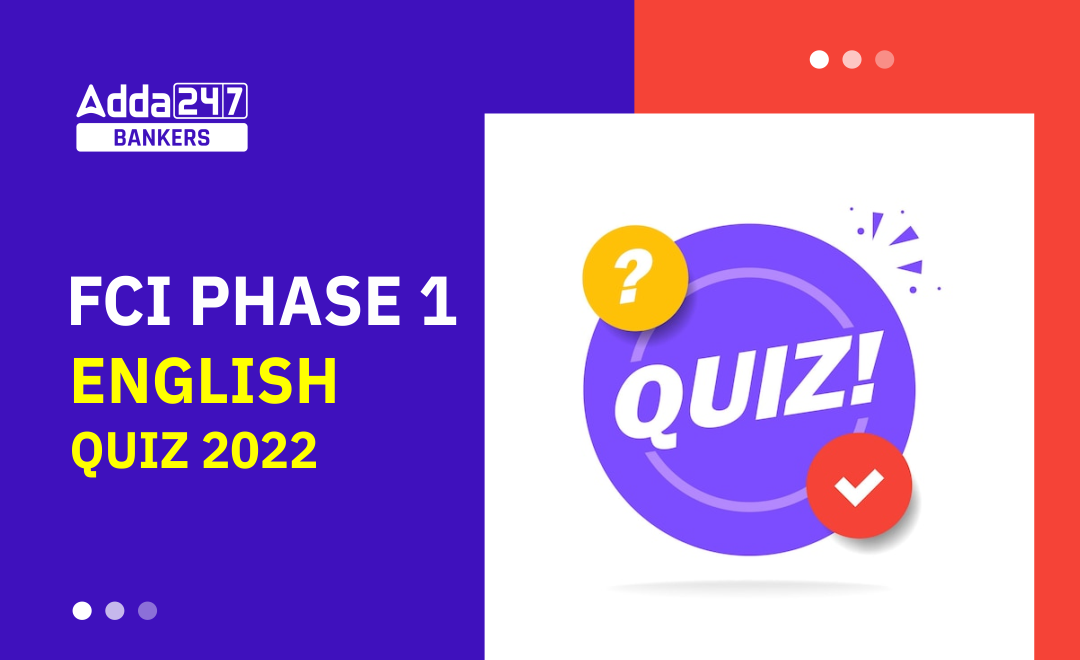Directions (1-5): Rearrange the following seven sentences (A), (B), (C), (D), (E), (F) and (G) in the proper sequence to form a meaningful paragraph and then answer the questions given below.
(A) He went into the shop of the chemist and told him, “Your window pane has been broken by my mistake.”
(B) The boy was poor. He said, “I have no money, but I’ll earn some money by working as a labourer and then I’II get the new window pane fitted.”
(C) A boy named Charley was going, tossing a ball in a city.
(D) Charley did not run away from there because he was a brave and truthful boy.
(E) The chemist said, “Get a new window pane fitted.”
(F) Then he worked as a labourer at the chemist’s shop for several days and earned the money for buying the window pane and paid it to the chemist.
(G) The ball struck the window pane of the shop of chemist and the window pane was broken.
Q1. Which of the following would be the FIRST sentence after rearrangement?(a) C
(b) A
(c) G
(d) E
(e) F
Q2. Which of the following would be the SECOND sentence after rearrangement?
(a) D
(b) C
(c) A
(d) G
(e) B
Q3. Which of the following would be the THIRD sentence after rearrangement?
(a) A
(b) B
(c) C
(d) F
(e) D
Q4. Which of the following would be the FOURTH sentence after rearrangement?
(a) B
(b) A
(c) D
(d) C
(e) E
Q5. Which of the following would be the LAST (SEVENTH) sentence after rearrangement?
(a) E
(b) D
(c) F
(d) B
(e) A
Directions (6-15) : In the following passage there are blanks, each of which has been numbered. These numbers are printed below the passage and against each, five words are suggested, one of of which fits the blank appropriately. Find out the appropriate word in each case.
Q6. Once upon a time, two friends were (6) through the desert. During some point of the (7) they had an argument, and one friend slapped the other one in the face. The one who got slapped was (8), but without saying anything, he wrote in the sand, “Today my best friend slapped me in the face.” They kept on walking (9) they found an oasis, where they (10) to take a both. The one, who had been slapped, got (11) in the quicksand and started drowing, but the friend saved him. After the friend (12) from the near drowning, he wrote on a stone, “The friend who had slapped and saved his best friend asked him, “After I hurt you, you wrote in the sand and (13) you write on a stone, why?” The other friend (14), “When someone hurts us, we should write it down in sand where winds of forgiveness can erase it away. But, when someone does something good for us, we must (15) it in stone where no wind can ever erase it.”
(a) crawling
(b) speaking
(c) swimming
(d) walking
(e) dancing
Q7. Once upon a time, two friends were (6) through the desert. During some point of the (7) they had an argument, and one friend slapped the other one in the face. The one who got slapped was (8), but without saying anything, he wrote in the sand, “Today my best friend slapped me in the face.” They kept on walking (9) they found an oasis, where they (10) to take a both. The one, who had been slapped, got (11) in the quicksand and started drowing, but the friend saved him. After the friend (12) from the near drowning, he wrote on a stone, “The friend who had slapped and saved his best friend asked him, “After I hurt you, you wrote in the sand and (13) you write on a stone, why?” The other friend (14), “When someone hurts us, we should write it down in sand where winds of forgiveness can erase it away. But, when someone does something good for us, we must (15) it in stone where no wind can ever erase it.”
(a) journey
(b) sand
(c) running
(d) border
(e) hunt
Q8. Once upon a time, two friends were (6) through the desert. During some point of the (7) they had an argument, and one friend slapped the other one in the face. The one who got slapped was (8), but without saying anything, he wrote in the sand, “Today my best friend slapped me in the face.” They kept on walking (9) they found an oasis, where they (10) to take a both. The one, who had been slapped, got (11) in the quicksand and started drowing, but the friend saved him. After the friend (12) from the near drowning, he wrote on a stone, “The friend who had slapped and saved his best friend asked him, “After I hurt you, you wrote in the sand and (13) you write on a stone, why?” The other friend (14), “When someone hurts us, we should write it down in sand where winds of forgiveness can erase it away. But, when someone does something good for us, we must (15) it in stone where no wind can ever erase it.”
(a) dead
(b) captured
(c) presentable
(d) missing
(e) hurt
Q9. Once upon a time, two friends were (6) through the desert. During some point of the (7) they had an argument, and one friend slapped the other one in the face. The one who got slapped was (8), but without saying anything, he wrote in the sand, “Today my best friend slapped me in the face.” They kept on walking (9) they found an oasis, where they (10) to take a both. The one, who had been slapped, got (11) in the quicksand and started drowing, but the friend saved him. After the friend (12) from the near drowning, he wrote on a stone, “The friend who had slapped and saved his best friend asked him, “After I hurt you, you wrote in the sand and (13) you write on a stone, why?” The other friend (14), “When someone hurts us, we should write it down in sand where winds of forgiveness can erase it away. But, when someone does something good for us, we must (15) it in stone where no wind can ever erase it.”
(a) as
(b) until
(c) from
(d) with
(e) through
Q10. Once upon a time, two friends were (6) through the desert. During some point of the (7) they had an argument, and one friend slapped the other one in the face. The one who got slapped was (8), but without saying anything, he wrote in the sand, “Today my best friend slapped me in the face.” They kept on walking (9) they found an oasis, where they (10) to take a both. The one, who had been slapped, got (11) in the quicksand and started drowing, but the friend saved him. After the friend (12) from the near drowning, he wrote on a stone, “The friend who had slapped and saved his best friend asked him, “After I hurt you, you wrote in the sand and (13) you write on a stone, why?” The other friend (14), “When someone hurts us, we should write it down in sand where winds of forgiveness can erase it away. But, when someone does something good for us, we must (15) it in stone where no wind can ever erase it.”
(a) decided
(b) fell
(c) made
(d) want
(e) left
Q11. Once upon a time, two friends were (6) through the desert. During some point of the (7) they had an argument, and one friend slapped the other one in the face. The one who got slapped was (8), but without saying anything, he wrote in the sand, “Today my best friend slapped me in the face.” They kept on walking (9) they found an oasis, where they (10) to take a both. The one, who had been slapped, got (11) in the quicksand and started drowing, but the friend saved him. After the friend (12) from the near drowning, he wrote on a stone, “The friend who had slapped and saved his best friend asked him, “After I hurt you, you wrote in the sand and (13) you write on a stone, why?” The other friend (14), “When someone hurts us, we should write it down in sand where winds of forgiveness can erase it away. But, when someone does something good for us, we must (15) it in stone where no wind can ever erase it.”
(a) home
(b) stuck
(c) blended
(d) mixed
(e) sitting
Q12. Once upon a time, two friends were (6) through the desert. During some point of the (7) they had an argument, and one friend slapped the other one in the face. The one who got slapped was (8), but without saying anything, he wrote in the sand, “Today my best friend slapped me in the face.” They kept on walking (9) they found an oasis, where they (10) to take a both. The one, who had been slapped, got (11) in the quicksand and started drowing, but the friend saved him. After the friend (12) from the near drowning, he wrote on a stone, “The friend who had slapped and saved his best friend asked him, “After I hurt you, you wrote in the sand and (13) you write on a stone, why?” The other friend (14), “When someone hurts us, we should write it down in sand where winds of forgiveness can erase it away. But, when someone does something good for us, we must (15) it in stone where no wind can ever erase it.”
(a) separated
(b) leaked
(c) died
(d) recovered
(e) saved
Q13. Once upon a time, two friends were (6) through the desert. During some point of the (7) they had an argument, and one friend slapped the other one in the face. The one who got slapped was (8), but without saying anything, he wrote in the sand, “Today my best friend slapped me in the face.” They kept on walking (9) they found an oasis, where they (10) to take a both. The one, who had been slapped, got (11) in the quicksand and started drowing, but the friend saved him. After the friend (12) from the near drowning, he wrote on a stone, “The friend who had slapped and saved his best friend asked him, “After I hurt you, you wrote in the sand and (13) you write on a stone, why?” The other friend (14), “When someone hurts us, we should write it down in sand where winds of forgiveness can erase it away. But, when someone does something good for us, we must (15) it in stone where no wind can ever erase it.”
(a) so
(b) how
(c) when
(d) tomorrow
(e) now
Q14. Once upon a time, two friends were (6) through the desert. During some point of the (7) they had an argument, and one friend slapped the other one in the face. The one who got slapped was (8), but without saying anything, he wrote in the sand, “Today my best friend slapped me in the face.” They kept on walking (9) they found an oasis, where they (10) to take a both. The one, who had been slapped, got (11) in the quicksand and started drowing, but the friend saved him. After the friend (12) from the near drowning, he wrote on a stone, “The friend who had slapped and saved his best friend asked him, “After I hurt you, you wrote in the sand and (13) you write on a stone, why?” The other friend (14), “When someone hurts us, we should write it down in sand where winds of forgiveness can erase it away. But, when someone does something good for us, we must (15) it in stone where no wind can ever erase it.”
(a) called
(b) tell
(c) replied
(d) questioned
(e) asked
Q15. Once upon a time, two friends were (6) through the desert. During some point of the (7) they had an argument, and one friend slapped the other one in the face. The one who got slapped was (8), but without saying anything, he wrote in the sand, “Today my best friend slapped me in the face.” They kept on walking (9) they found an oasis, where they (10) to take a both. The one, who had been slapped, got (11) in the quicksand and started drowing, but the friend saved him. After the friend (12) from the near drowning, he wrote on a stone, “The friend who had slapped and saved his best friend asked him, “After I hurt you, you wrote in the sand and (13) you write on a stone, why?” The other friend (14), “When someone hurts us, we should write it down in sand where winds of forgiveness can erase it away. But, when someone does something good for us, we must (15) it in stone where no wind can ever erase it.”
(a) talk
(b) push
(c) engrave
(d) add
(e) bury
Solutions
S1.Ans.(a)
Sol. The correct sequence to form meaningful paragraph is CGDAEBF.
S2.Ans.(d)
Sol.The correct sequence to form meaningful paragraph is CGDAEBF.
S3.Ans.(e)
Sol. The correct sequence to form meaningful paragraph is CGDAEBF.
S4.Ans.(b)
Sol. The correct sequence to form meaningful paragraph is CGDAEBF.
S5.Ans.(c)
Sol. The correct sequence to form meaningful paragraph is CGDAEBF.
S6. Ans.(d)
S7. Ans.(a)
S8. Ans.(e)
S9. Ans.(b)
S10. Ans.(a)
S11. Ans.(b)
S12. Ans.(d)
S13. Ans.(e)
S14. Ans.(c)
S15. Ans.(c)





 Bihar ANM Recruitment 2026 Update: 8938 ...
Bihar ANM Recruitment 2026 Update: 8938 ...
 UP LT Grade Teacher Mains Apply Online 2...
UP LT Grade Teacher Mains Apply Online 2...
 Bihar Jeevika Cut Off 2026: इतना हाई गया...
Bihar Jeevika Cut Off 2026: इतना हाई गया...










